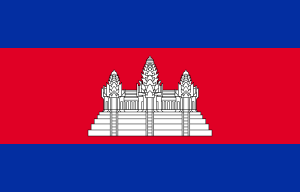Language/Central-khmer/Grammar/Possessive-Pronouns
| ◀️ Personal Pronouns — Previous Lesson | Next Lesson — Family Members ▶️ |
Introduction[edit | edit source]
In this lesson, we will delve into the topic of possessive pronouns in Central Khmer. Possessive pronouns are an essential part of the language as they allow us to indicate ownership and possession. By understanding how to form and use possessive pronouns, you will be able to express yourself more accurately and confidently in Central Khmer. Throughout this lesson, we will explore the various forms of possessive pronouns, their proper usage, and pronunciation. To ensure a thorough understanding, we will provide numerous examples and exercises for practice.
Possessive Pronouns in Central Khmer[edit | edit source]
Possessive pronouns in Central Khmer are used to indicate ownership or possession. They are formed by combining the appropriate pronoun with a possessive suffix. The possessive suffixes vary based on the gender and number of the possessor, as well as the relationship between the possessor and the possessed object. Let's explore the different forms of possessive pronouns in Central Khmer.
Singular Possessive Pronouns[edit | edit source]
In Central Khmer, singular possessive pronouns are used when the possessor is singular. The possessive pronoun agrees in gender and number with the possessor. Here are the singular possessive pronouns in Central Khmer:
| Central Khmer | Pronunciation | English Translation |
|---|---|---|
| ខ្ញុំរបស់ខ្ញុំ | knyom robos knyom | mine (masculine) |
| អ្នករបស់អ្នក | neak robos neak | yours (masculine) |
| ការពិតប្រាកដ | kar pit prakad | his |
| ប្រុសរបស់ប្រុស | pros robos pros | his (emphatic) |
| ជួបរបស់ជួប | choub robos choub | his (emphatic) |
| យ៉ាងរបស់អ្នក | yang robos neak | yours (feminine) |
| មាន់របស់មាន់ | menh robos menh | hers (emphatic) |
| មិនអ្វីខ្លះ | min avy klach | nothing (gender-neutral) |
Plural Possessive Pronouns[edit | edit source]
When the possessor is plural, the possessive pronouns in Central Khmer also change to reflect this. Here are the plural possessive pronouns in Central Khmer:
| Central Khmer | Pronunciation | English Translation |
|---|---|---|
| ពួកគេរបស់ពួកគេ | puk ke robos puk ke | ours (inclusive) |
| យើងរបស់យើង | yerng robos yerng | ours (exclusive) |
| អ្នករបស់អ្នក | neak robos neak | yours (plural) |
| ពួកគេរបស់ពួកគេ | puk ke robos puk ke | theirs (emphatic) |
| អ្នករបស់អ្នក | neak robos neak | theirs |
Cultural Insights[edit | edit source]
In Central Khmer culture, possession and ownership are important concepts. Possessive pronouns play a crucial role in expressing these concepts accurately. Additionally, the use of possessive pronouns can vary based on the relationship between the possessor and the possessed object. For example, in a formal setting, you may use different possessive pronouns compared to a casual or intimate setting. Understanding these nuances will not only help you communicate effectively in Central Khmer but also show respect for the cultural norms and traditions of the language.
Practice Exercises[edit | edit source]
Now it's time to practice what you have learned. Below are some exercises to reinforce your understanding of possessive pronouns in Central Khmer. Try to complete each exercise to the best of your ability, and then check your answers against the provided solutions.
Exercise 1: Fill in the Blanks
Fill in the blanks with the appropriate possessive pronoun in Central Khmer.
1. នេះជាអំពីររបស់________។ (This is his book.) 2. នេះជាអំពីររបស់________។ (This is her book.) 3. នេះជាអំពីររបស់________។ (This is our book.) 4. នេះជាអំពីររបស់________។ (This is their book.) 5. នេះជាអំពីររបស់________។ (This is your book.)
Exercise 2: Translate the Sentences
Translate the following sentences from English to Central Khmer, using the appropriate possessive pronoun.
1. This is my house. 2. That is her car. 3. These are our dogs. 4. Those are their books. 5. Is this your pen?
Exercise 3: Explain the Relationship
Explain the relationship between the possessor and the possessed object in each sentence, using the appropriate possessive pronoun.
1. សៀវភៅនេះជារបស់ខ្ញុំ។ (This book is mine.) 2. ទីក្រុងនេះជារបស់អ្នក។ (This city is yours.) 3. កំពុងរត់បុរាណនេះជារបស់ពួកយើង។ (This restaurant is ours.) 4. សៀវភៅនេះជារបស់ពួកគេ។ (This book is theirs.) 5. ជួបនេះជារបស់អ្នកឫរបស់ខ្ញុំ? (Is this umbrella yours or mine?)
Solutions[edit | edit source]
Exercise 1: Fill in the Blanks
1. នេះជាអំពីររបស់គាត់។ (This is his book.) 2. នេះជាអំពីររបស់ប្រពន្ធ័។ (This is her book.) 3. នេះជាអំពីររបស់យើង។ (This is our book.) 4. នេះជាអំពីររបស់ពួកគេ។ (This is their book.) 5. នេះជាអំពីររបស់អ្នក។ (This is your book.)
Exercise 2: Translate the Sentences
1. នេះគឺជាផ្ទះរបស់ខ្ញុំ។ 2. នេះគឺជារយៈពេលរបស់ប្រពន្ធ័។ 3. ទីក្រុងទាំងនេះគឺជាទីក្រុងរបស់យើង។ 4. នេះគឺជាសៀវភៅរបស់ពួកគេ។ 5. តើនេះគឺជាពងរបស់អ្នកឬរបស់ខ្ញុំ?
Exercise 3: Explain the Relationship
1. សៀវភៅនេះជារបស់ខ្ញុំ។ (This book is mine.) - The relationship is possessive; the book belongs to "me". 2. ទីក្រុងនេះជារបស់អ្នក។ (This city is yours.) - The relationship is possessive; the city belongs to "you". 3. កំពុងរត់បុរាណនេះជារបស់ពួកយើង។ (This restaurant is ours.) - The relationship is possessive; the restaurant belongs to "us". 4. សៀវភៅនេះជារបស់ពួកគេ។ (This book is theirs.) - The relationship is possessive; the book belongs to "them". 5. ជួបនេះជារបស់អ្នកឫរបស់ខ្ញុំ? (Is this umbrella yours or mine?) - The relationship is possessive; the umbrella belongs to either "you" or "me".
Conclusion[edit | edit source]
Congratulations! You have successfully learned about possessive pronouns in Central Khmer. By mastering the various forms and understanding their proper usage, you will be able to express ownership and possession accurately in your conversations. Keep practicing and applying what you have learned to further enhance your language skills. Good luck!
Sources[edit | edit source]
Other Lessons[edit | edit source]
- Describing Actions and States
- Plurals
- Basic Word Order
- Using Conjunctions
- Describing People and Things
- Present Tense
- 0 to A1 Course
- Future Tense
- Give your Opinion
- Gender
| ◀️ Personal Pronouns — Previous Lesson | Next Lesson — Family Members ▶️ |

